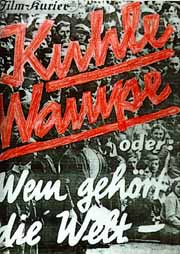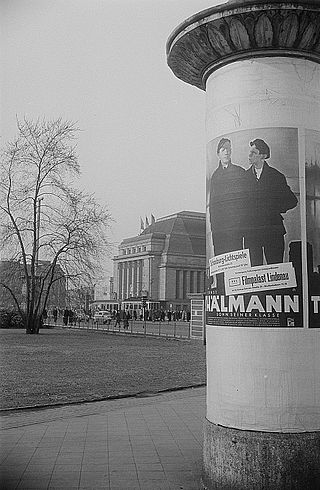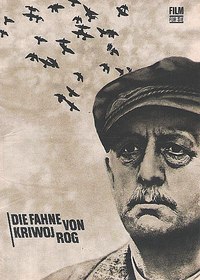Related Research Articles

DEFA was the state-owned film studio of the German Democratic Republic throughout the country's existence.

Richard Baer was a German SS officer who, among other assignments, was the final commandant of Auschwitz I concentration camp from May 1944 to January 1945, and right after, from February to April 1945, commandant of Mittelbau-Dora concentration camp. Following the war, Baer lived under an assumed name to avoid prosecution but was recognized and arrested in December 1960. He died in detention before he could stand trial.

Frank Paul Beyer was a German film director. In East Germany he was one of the most important film directors, working for the state film monopoly DEFA and directed films that dealt mostly with the Nazi era and contemporary East Germany. His film Trace of Stones was banned for 20 years in 1966 by the ruling SED. His 1975 film Jacob the Liar was the only East German film ever nominated for an Academy Award. After the fall of the Berlin Wall in 1989 until his death he mostly directed television films.

Gustav Franz Wagner was an Austrian member of the SS with the rank of Staff sergeant (Oberscharführer). Wagner was a deputy commander of Sobibor extermination camp in German-occupied Poland, where 200,000-250,000 Jews were murdered in the camp's gas chambers during Operation Reinhard. Due to his brutality, he was known as "The Beast" and "Wolf".

Kuhle Wampe is a 1932 German feature film about unemployment, homelessness and left wing politics in the Weimar Republic produced by Prometheus Film. The script was conceived and written by Bertolt Brecht. He also directed the concluding scene: a political debate between strangers on a train about the world coffee market. The rest of the film was directed by Slatan Dudow. The film music was composed by Hanns Eisler.

Ernst Thälmann is an East German film in two parts about the life of Ernst Thälmann, leader of the Communist Party of Germany during much of the Weimar Republic, directed by Kurt Maetzig and starring Günther Simon in the title role. The first part, Ernst Thälmann - Sohn seiner Klasse, was released in 1954. It was followed by the 1955 sequel. Ernst Thälmann - Führer seiner Klasse.

Stars is a 1959 film directed by Konrad Wolf. It tells the story of a Nazi officer who falls in love with a Greek Jewish girl while escorting Jewish prisoners through Bulgaria to a concentration camp. The film won the Special Jury Prize at the 1959 Cannes Film Festival.

Naked Among Wolves is a 1963 East German film directed by Frank Beyer and starring Erwin Geschonneck and Armin Mueller-Stahl. The film is based on author Bruno Apitz's 1958 novel by the same name. The film was remade in 2015 under the direction of Philipp Kadelbach.

Five Cartridges is a 1960 East German film directed by Frank Beyer and starring Erwin Geschonneck, Armin Mueller-Stahl and Manfred Krug.
I Was Nineteen is a 1968 East German film produced by Konrad Wolf for the DEFA studio.
Horst Fritz Otto Giese was an East German actor.

The Condemned Village is a 1952 East German propaganda film directed by Martin Hellberg.The film is about a man who returns from a Soviet prisoner-of-war camp to his home village in occupied West Germany and leads a resistance to the American military's plans to demolish the village to build an airfield. The film was commissioned to build East German opposition to the United States and support for the Soviet Union during the early Cold War.
Alarm in the Circus is an East German crime film directed by Gerhard Klein. It was released in 1954.
Schlösser und Katen is an East German black-and-white film, directed by Kurt Maetzig. It was released in 1957.
A Lively Christmas Eve is an East German comedy Christmas film, directed by Günter Reisch. It was released in 1962.

The Banner of Krivoi Rog is an East German film, directed by Kurt Maetzig. It was released in 1967.
Sun Seekers is an East German film, directed by Konrad Wolf during 1958. It was banned and subsequently released only in 1972.

The Axe of Wandsbek is a 1951 East German film, directed by Falk Harnack.
Manfred Richter was a German writer, scriptwriter and dramaturg.
Hans Oliva-Hagen was a journalist, writer, and screenwriter in the German Democratic Republic who wrote under the pseudonyms Hans Oliva and John Ryder. His most important works include his collaboration on the scripts for the DEFA film Carbide and Sorrel (1963) and the five-part GDR television film Conscience in Riot (1961). An anti-fascist militant and Holocaust survivor of Jewish heritage, Oliva-Hagen was active in the German resistance to Nazism.
References
- ↑ Ingrid Poss. Spur der Filme: Zeitzeugen über die DEFA. ISBN 978-3-86153-401-3. Pages 186-7.
- ↑ Dagmar Schittly. Zwischen Regie und Regime. Die Filmpolitik der SED im Spiegel der DEFA-Produktionen. ISBN 978-3-86153-262-0. Page 123.
- ↑ Margaret McCarthy. Light motives: German popular film in perspective. ISBN 978-0-8143-3044-9. Page 236.
- ↑ Joshua Feinstein. The Triumph of the Ordinary: Depictions of Daily Life in the East German Cinema, 1949-1989. ISBN 978-0-8078-5385-6. Page 178.
- ↑ Seán Allan, John Sandford. DEFA: East German cinema, 1946-1992. ISBN 978-1-57181-753-2. Page 11.
- ↑ Catherine Fowler. The European cinema reader. ISBN 978-0-415-24092-5. Page 155.
- ↑ Daniela Berghahn. Hollywood behind the Wall: the cinema of East Germany. ISBN 978-0-7190-6172-1. Page 28.